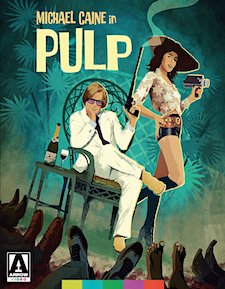Pulp: Special Edition (Blu-ray Review)

Director
Mike HodgesRelease Date(s)
1972 (December 12, 2017)Studio(s)
United Artists/MGM/20th Century Fox (Arrow Video)- Film/Program Grade: B-
- Video Grade: A-
- Audio Grade: B-
- Extras Grade: C+
Review
Pulp is nothing if not interesting. A combination of mystery, comedy, and thriller, it’s a rather laid-back affair with hardly any forward momentum behind it. It seems to exist in its own narrated universe of an author relating his story to us (often lying about certain events as they take place). It’s also a bit of a bumbling adventure story as Michael Caine’s suave character of Mickey King has a witty, sardonic view of everything happening around and to him, never really getting upset or uptight about any of it until the very end. Yet at the same time, he’s not really much of a protagonist either, which is partly what makes Pulp a complicated but an out of the ordinary experience.
Mike Hodges, who also helmed Get Carter one year before and Flash Gordon eight years later, wrote and directed this story of a paperback novelist hired to ghostwrite a celebrity autobiography, finding himself the target of the criminal underworld to prevent its publication. Shot on the beautiful European archipelago of Malta, this blackly comic tale also features a stand-out performance by Mickey Rooney, as well as Lizabeth Scott in her final film role. Pulp, ultimately, is less of a crime thriller and more of an ostentatious escapade with a solid acting presence at the center of it. Pretense may hang over it a bit, but it has a hypnotic quality that helps keep you invested in it, despite its lack of narrative propulsion.
Arrow Video premieres the film on Blu-ray via a 2K restoration from the original 35mm interpositive element with color grading supervised by director of photography Ousama Rawi. The resulting presentation is a potent one. Stable and clean, sporting only mild speckling and scratches periodically, it’s also crisp with well-resolved grain and high levels of fine detail in facial textures, clothing, and environments. It’s also a natural-looking presentation with a strong but precise color palette, exhibiting a copious amount of browns and beiges, which are clearly the design of its aforementioned cinematographer. Skin tones appear warm and natural while black levels are inherently crushed from time to time, or conversely lightened due to the grain. Overall brightness and contrast is excellent as well. The only problem I found with the presentation was, what appears to be, a minor encoding issue around the 1:21:06 mark along the extreme bottom edge of the screen. Chunks of clumpy pixels pop up briefly there, lasting less than a second. Whether this is inherent in the original file or simply something that’s exclusive to my copy remains unclear at this juncture. The audio for the film is presented via an English 2.0 mono LPCM track with optional subtitles in English SDH. While fairly flat and unremarkable, it does its job well with clear but narrow dialogue and decent heft for George Martin’s pleasant, laid-back score. Musical numbers and sound effects are of the same lineage and the overall quality of the track is clean without distortions or hiss-related issues.
The extras for this release are brief, but you do get four new interviews: one with writer/director Mike Hodges, another with director of photography Ousama Rawi, another with editor John Glen (erroneously credited as “assistant director” on the cover art), and another with Tony Klinger, son of producer Michael Klinger. All of this interview material goes into quite a bit of detail about the development and making of the film with its different subjects. Also included are 4 still galleries consisting of 207 images total; the film’s theatrical trailer, presented in a forced full screen view wherein the sides of the original widescreen frame have been cut off; and last but not least, a 32-page insert booklet with the essays “A Death Rattle in Paperback” by film critic Alexandria Heller-Nicholas and “The Letter J.G. Ballard Wrote to Me About My Thriller Pulp” by director Mike Hodges, as well restoration details.
In all honestly, I was initially ambivalent towards Pulp upon my first viewing of it. I didn’t quite know what to make of it, but it got me thinking about it, which is always the mark of something worth seeing. If you have similar film-watching tendencies, I urge you to check out Arrow Video’s very fine Blu-ray release of the film.
- Tim Salmons

